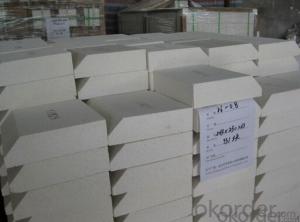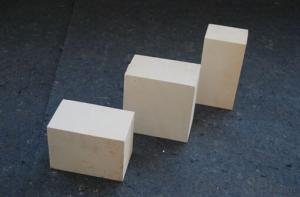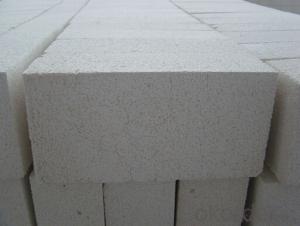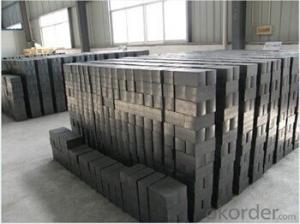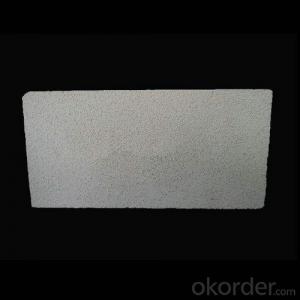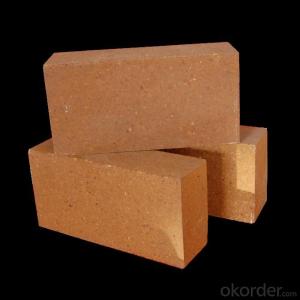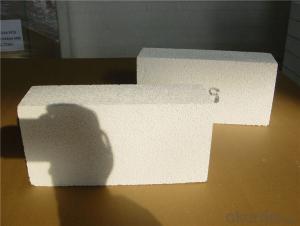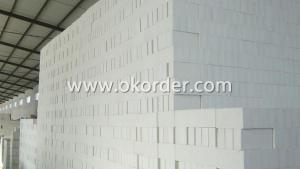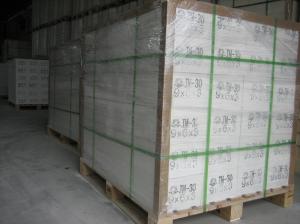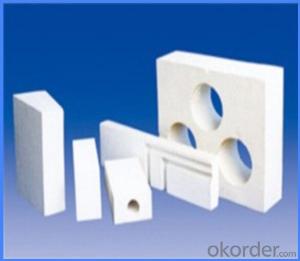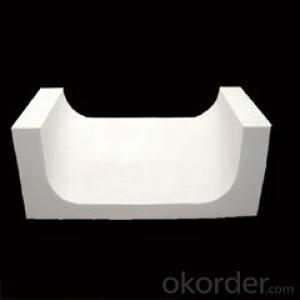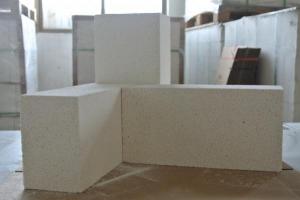Refractory Mullite Insulating Fire Brick JM 23
- Loading Port:
- Shanghai
- Payment Terms:
- TT OR LC
- Min Order Qty:
- 5000 kg
- Supply Capability:
- 100000 kg/month
OKorder Service Pledge
OKorder Financial Service
You Might Also Like
OKORDER Series Insulating Bricks
OKORDER series insulating bricks are a kind of highly efficient, energy saving, low-carbon, environmental protection advanced products which are manufactured according to ASTM standard. OKORDER series products are the best lining and insulation materials in all types of industrial furnaces in the field of Metallurgy, Aluminum, Petrochemical, Ceramics, Power and Glass. They can be applied as heat insulation or no-melt erosion parts of the working layer. The products have been widely used in the following furnaces and achieved satisfactory results.
Application of Insulating Bricks
Metallurgy industry: Blast furnace, Hot blast stove, Reheating furnace, etc.
Petrochemical industry: Ethylene cracking furnace, Hydrogen production furnace, Primary reformer furnace, Reheating furnace, etc.
Ceramics Industry: Roller kiln, Pusher kiln, etc.
Glass industry: Glass furnace regenerator, etc.
Carbon Industry: Carbon roaster, etc.
Aluminum electrolytic industry: aluminum reduction cells,etc.
Other industries: Tunnel kiln, Shuttle kiln, etc.
Advantages of Insulating Bricks
Low Thermal Conductivity: More porosity brings excellent insulation effect, energy saving.
High Crushing Strength: High crushing strength under thermal state, volume stability.
Low Heat Storage: Little thermal storage when absorb more heat, energy saving effect is obvious.
High Purity: Low content of iron, alkaline and metal impurities.
Accurate Dimension: Precise brick size by machining, cutting and grinding special shapes, expediting bricklaying.
Picture of Insulating Bricks
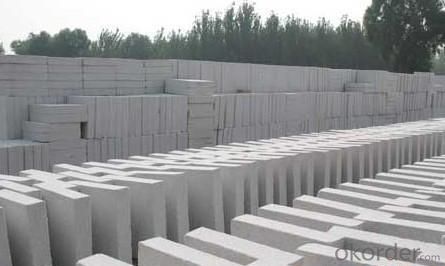
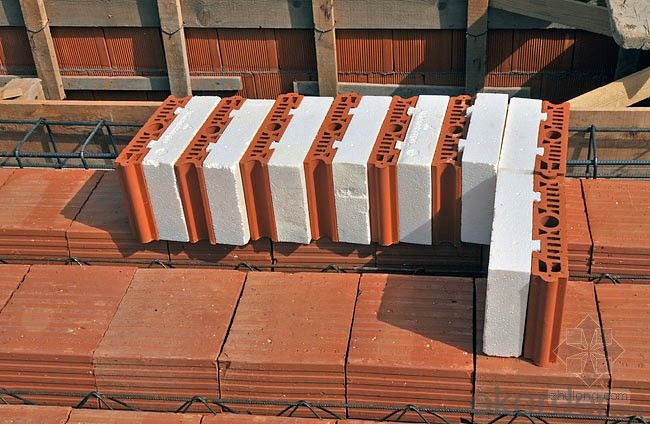
FAQ
1. Which products do you have?
We have all kinds of refractory brick, castable, mortar, cement, ceramic fiber products, etc.
Or you could browse our products to choose what you need.
2. How do you control the products quality?
With strict quality control system throughout the materials selection and production process, our refractory and ceramic fiber products quality is effectively controlled to meet customer requirements.
From the raw materials selecting, our quality control begin. The quality certificates of raw materials are required and each batch will be tested before using. During production, the quality control are conducted by workers and then each piece will be sorted and examined by quality supervise.
3. Can you give me a brief introduction of the application of your products?
We are mainly specializing in the refractory materials in iron and steel, cement, glass, ceramics, petrochemical, electric power Industry, etc.
4. If I need your offer, what information do you need?
In order to choose suitable products, it will be appreciated to provide us the information, such us specification, technical data, order quantity, products application etc.
If any question, please contact us freely.
- Q:Can insulating fire bricks be used for insulation in ovens?
- Indeed, ovens can make use of insulating fire bricks for insulation purposes. These bricks are specifically crafted to endure extreme temperatures and offer exceptional insulating capabilities. With their low thermal conductivity, they effectively retain heat, preventing its escape from the oven. This aids in maintaining a steady temperature within the oven, promoting efficient and uniform cooking. Moreover, these bricks are resilient against thermal shock, enabling them to withstand rapid temperature fluctuations without sustaining damage. Consequently, utilizing insulating fire bricks for oven insulation proves to be a sensible and efficient decision.
- Q:How do insulating fire bricks affect the overall weight of a structure?
- The lightweight nature of insulating fire bricks can have a significant impact on the weight of a structure. These bricks are specifically designed to be lightweight, with low density and high thermal resistance properties. Unlike traditional bricks or concrete blocks, insulating fire bricks are made from materials like clay, silica, and aluminum oxide. By using insulating fire bricks in construction, the overall load on a structure can be reduced. This is especially beneficial in situations where weight restrictions or limitations are a concern, such as in high-rise buildings or areas with poor soil conditions. The lightweight nature of these bricks also makes transportation, handling, and installation easier, resulting in more efficient and cost-effective construction processes. Additionally, their reduced weight can eliminate the need for heavy machinery or specialized equipment during construction. Furthermore, the use of insulating fire bricks can improve the energy efficiency of a structure. Their high thermal resistance properties minimize heat transfer, making the building more thermally efficient. This leads to lower energy consumption for heating or cooling, resulting in reduced utility bills and a smaller carbon footprint. In conclusion, insulating fire bricks significantly impact the weight of a structure by providing a lightweight alternative to traditional bricks or concrete blocks. Their low density not only reduces the load on the structure but also offers benefits such as easier handling and installation. Additionally, their high thermal resistance properties contribute to improved energy efficiency.
- Q:Can insulating fire bricks be used in the construction of drying ovens?
- Yes, insulating fire bricks can be used in the construction of drying ovens. These bricks are designed to withstand high temperatures and have excellent thermal insulation properties, making them ideal for creating a heat-efficient environment in drying ovens. They can help in maintaining a consistent temperature and preventing heat loss, thereby improving the drying process and energy efficiency of the oven.
- Q:Can insulating fire bricks be used in ladle covers?
- Yes, insulating fire bricks can be used in ladle covers. Insulating fire bricks are designed to withstand high temperatures and provide thermal insulation. They are commonly used in various industrial applications, including ladle covers, to retain heat and prevent heat loss.
- Q:Can insulating fire bricks be used in the construction of thermal oxidizers?
- Certainly, thermal oxidizers can utilize insulating fire bricks in their construction. The remarkable thermal insulation properties of these bricks render them perfect for situations where precise containment of elevated temperatures is necessary. Thermal oxidizers function by incinerating volatile organic compounds (VOCs) at high temperatures, and the incorporation of insulating fire bricks aids in preserving the essential temperature within the combustion chamber and minimizing heat dissipation to the surroundings. Furthermore, the lightweight nature, durability, and impressive resistance to thermal shock exhibited by insulating fire bricks further enhance their appropriateness for deployment in thermal oxidizers.
- Q:Are insulating fire bricks suitable for use in lime kilns?
- Insulating fire bricks are indeed a suitable option for utilization in lime kilns. Lime kilns function at elevated temperatures, usually ranging from 900 to 1200 degrees Celsius. These insulating fire bricks are specifically constructed to endure such extreme temperatures and offer exceptional thermal insulation. With their low thermal conductivity, they aid in conserving heat and upholding high temperatures inside the kiln. Moreover, these bricks possess a lightweight nature and exhibit considerable resistance to thermal shock, rendering them ideal for the cyclic heating and cooling procedures employed in lime kilns.
- Q:How does an insulating fire brick differ from a regular fire brick?
- An insulating fire brick differs from a regular fire brick in terms of its composition and thermal conductivity. Insulating fire bricks are made from lightweight materials that have low thermal conductivity, allowing them to retain heat more efficiently and provide better insulation. On the other hand, regular fire bricks are typically denser and have higher thermal conductivity, making them suitable for applications where heat retention is not the primary concern.
- Q:Can insulating fire bricks be used in the construction of fireplaces?
- Insulating fire bricks are a viable option for fireplace construction. These bricks are specifically designed to endure high temperatures, making them perfect for lining the inside of a fireplace. Their exceptional thermal insulation capabilities ensure that heat is contained within the fireplace, preventing excessive heat transfer to the surrounding structure. This not only enhances the efficiency of the fireplace but also reduces the likelihood of damage to nearby walls. Furthermore, these bricks are lightweight and easy to work with, making them convenient for construction purposes. They are also resistant to thermal shock, meaning they can withstand sudden temperature changes without cracking or breaking. Overall, insulating fire bricks are a dependable and efficient choice for building fireplaces.
- Q:Can insulating fire bricks be used for both residential and commercial purposes?
- Yes, insulating fire bricks can be used for both residential and commercial purposes. Insulating fire bricks are designed to provide excellent insulation and thermal protection, making them suitable for a wide range of applications. In residential settings, these bricks can be used for insulating fireplaces, wood-burning stoves, and pizza ovens, among others. In commercial settings, they are commonly used for kilns, furnaces, boilers, and industrial ovens. The versatility of insulating fire bricks makes them a popular choice for both residential and commercial projects where effective thermal insulation is required.
- Q:Are insulating fire bricks suitable for insulation in boilers?
- Yes, insulating fire bricks are suitable for insulation in boilers. Insulating fire bricks are specially designed to withstand high temperatures and provide excellent thermal insulation, making them ideal for use in boilers. They help to reduce heat loss, improve energy efficiency, and enhance the overall performance of the boiler.
1. Manufacturer Overview |
|
|---|---|
| Location | |
| Year Established | |
| Annual Output Value | |
| Main Markets | |
| Company Certifications | |
2. Manufacturer Certificates |
|
|---|---|
| a) Certification Name | |
| Range | |
| Reference | |
| Validity Period | |
3. Manufacturer Capability |
|
|---|---|
| a)Trade Capacity | |
| Nearest Port | |
| Export Percentage | |
| No.of Employees in Trade Department | |
| Language Spoken: | |
| b)Factory Information | |
| Factory Size: | |
| No. of Production Lines | |
| Contract Manufacturing | |
| Product Price Range | |
Send your message to us
Refractory Mullite Insulating Fire Brick JM 23
- Loading Port:
- Shanghai
- Payment Terms:
- TT OR LC
- Min Order Qty:
- 5000 kg
- Supply Capability:
- 100000 kg/month
OKorder Service Pledge
OKorder Financial Service
Similar products
New products
Hot products
Related keywords
